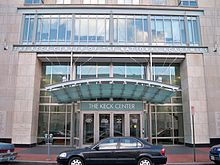National Academies of Sciences, Engineering, and Medicine

The Keck Center of the National Academies in Washington, D.C.
|
|
| Formation | 1863 |
|---|---|
| Headquarters | Washington, D.C., U.S. |
|
Membership
|
Scientists, engineers, and health professionals |
|
Official language
|
English |
The National Academies of Sciences, Engineering, and Medicine (also The Academies) serve collectively as the scientific national academy for the United States (US). The National Academies comprises: the National Academy of Sciences (NAS), the National Academy of Engineering (NAE), and the National Academy of Medicine (NAM).
The program units act as the "working arm" of the Academies, which serves to collect, analyze, and share information through studies and reports.
The Academies produce independent recommendations and policy reports by enlisting top scientists, engineers, health professionals, and other experts (not limited to those in Academies membership) to address the scientific and technical aspects of some of society's problems. These experts volunteer to serve on study committees that are convened to answer specific sets of questions. All committee members serve without pay. The Academies do not perform original research; rather they provide independent advice. Federal agencies are the primary financial sponsors of the Academies' work; additional studies are funded by state agencies, foundations, other private sponsors, and the National Academies endowment. The external sponsors have no control over the conduct or results of a study, once the statement of task and budget are finalized. Study committees gather information from many sources in public meetings but deliberate in private in order to avoid political, special interest, and sponsor influence.
Through this study process, the National Academies produce around 200 reports each year. Recent reports cover such topics as addressing the obesity epidemic, the use of forensics in the courtroom, invasive plants, pollinator collapse, underage drinking, the Hubble Telescope, vaccine safety, the hydrogen economy, transportation safety, climate change, and homeland security. Many reports influence policy decisions; some are instrumental in enabling new research programs; others provide independent program reviews. The National Academies Press is the publisher for the National Academies of Sciences, Engineering, and Medicine, and makes its publications available for free online reading, and the full book PDFs have been available for free download since 2011.
...
Wikipedia
